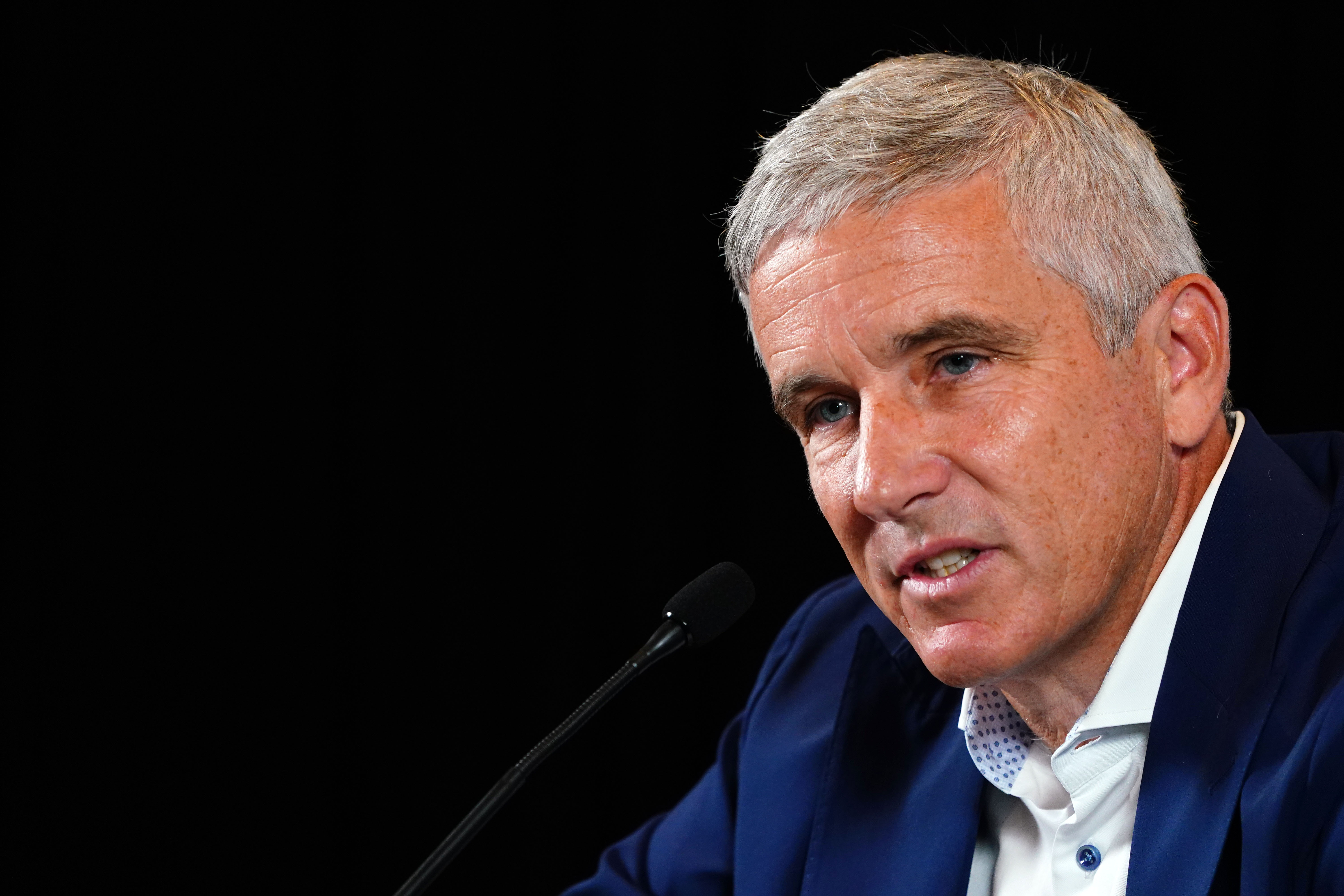It’s been 25 years since Tom Wolfe published “A Man in Full,” the novel in which an Atlanta good ol’ boy, Charlie Croker, sees the high times grind to a halt as the reserves of cash and goodwill so long extended to him finally run dry. Eventually, even his allies turn. “His botching things was malfeasance. It made them look so goddamned bad!” Wolfe wrote of Croker’s fleeing friends. “Half a billion! Now his heedless deadbeat squandering was making them all look like fools! Suckers! Patsies!”
For a time this summer, it seemed Jay Monahan was destined for his own “Cap’m Charlie” reckoning as the PGA Tour commissioner’s issues mirrored those of Wolfe’s character. There was the apparent need for a cash infusion to meet bills, laid bare in the announcement of a Framework Agreement with the Saudi Arabian Public Investment Fund. There were the legal headaches, LIV’s withdrawn litigation having been replaced with a Justice Department antitrust probe and U.S. Senate subcommittee theatrics. There were the people who thrived in the good times who began to sour when the going got tougher, in Monahan’s case the players, whose anger at the secrecy around the Saudi deal — and the associated moral backflip, but mostly the secrecy — threatened his future.
In retrospect, the least surprising moment of Monahan’s long, hot summer was his taking a month-long leave of absence to address his mental health.
The Monahan of ’23 is markedly different from what we saw twelve months ago at the Tour Championship, when he announced plans for designated events, increased purses and bonuses, and rookie subsidies. He was laying out a vision. Sure, it wasn’t his — it was largely the creation of Colin Neville, the Raine Group partner brought in to advise players by Tiger Woods and Rory McIlroy — but it was an actionable concept. There were specifics.
He relied on boilerplate remarks and repeatedly stiff-armed inquiries about the ongoing negotiations with the Saudis. “We continue to reinforce the fact that the framework agreement ultimately is the path that we’re on and when we’re able to share more information, we will,” he said.
Even when Monahan touted figures highlighting the robustness of the PGA Tour’s business — viewership, engagement, revenue, demographics — it felt like a perfunctory concession to metrics that only matter in a rational business environment, a conventional standard by which he is no longer judged. His shareholders in the locker room primarily have one yardstick (money) and one concern (how they’ll get more of it).
Which explains why the commissioner was at pains Tuesday to remind us for whom he works. Monahan never could muster the imperious swagger of his predecessors, but what little he had was extinguished by the recent revolt in which players demanded more say in governance. I asked if he saw that move by players as an indictment of how the organization has been managed.
“I did not,” he replied. “I look at this as not an indictment, but a very positive message… We’ve listened, we’ve responded, and now we have the right people, the right process in place for us to be able to move forward and determine that future. But I look at it as a positive and something that I and we embrace.”
Something else Monahan has embraced is this phrase: “a positive outcome for the PGA Tour,” words he relied upon several times today. What constitutes a “positive outcome” is, of course, wholly subjective. Some people within the Tour contend that a positive outcome has already been accomplished — the ending of litigation. Others point to the Tour’s creation of a for-profit entity to expand its product, an investment vehicle in which the Saudis need not be passengers, or at least not the only ones. There’s also a group for whom a positive outcome is no Saudi partnership at all, a position bolstered by reports this week from human rights groups that their putative business partners machine-gunned hundreds of migrants and asylum-seekers.
Monahan acknowledged that there is other investment interest — clean capital, as it were — but that he is focused on talks with the Saudi PIF. “I think the realization that there is an entity that can be invested into at the PGA Tour and the uniqueness of being able to invest into a professional sports league of the caliber, quality and sustainability of the PGA Tour, obviously has generated a lot of interest,” he said. “But in terms of alternatives, right now, you know, the sole conversation that we’re having is the conversation we’re having with PIF.”
Right now. Or until an alternative definition of a “positive outcome” has the votes.
The only area in which Monahan provided clarity was his health. “I have never felt better mentally and physically than I feel right now. And obviously, I had to take some steps to go from where I was to this position. But I’m a work in progress,” he said. “So I’m working on the things that I’ve learned that are going to help me in my life and help me in this role. That’s how I feel, but more importantly my doctors, my wife, and girls, ultimately, that’s how they feel about how I’m doing. They are my arbiters. I feel as strong as I’ve felt in a long, long time.”
In that too, Monahan echoes Wolfe’s Charlie Croker, who found comfort in his version of stoicism, albeit too late in his case.
While he didn’t offer much in the way of policy particulars, Monahan gave the impression of someone for whom professional stresses now seem less important, less defining. Whatever his other shortcomings this summer, that’s not a bad place to arrive at for a man charged with laying out a sumptuous banquet for people with competing views about the menu, the timeliness of the service and the sourcing of the food.

